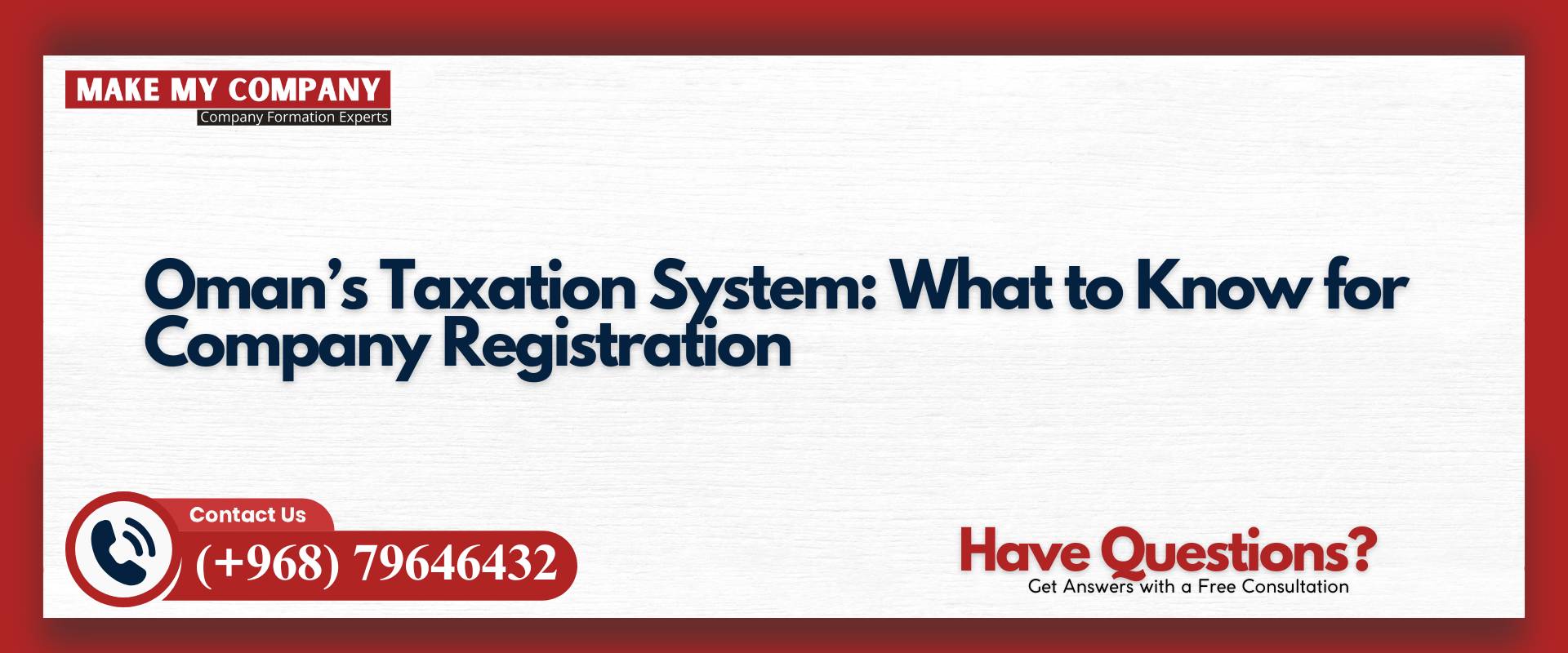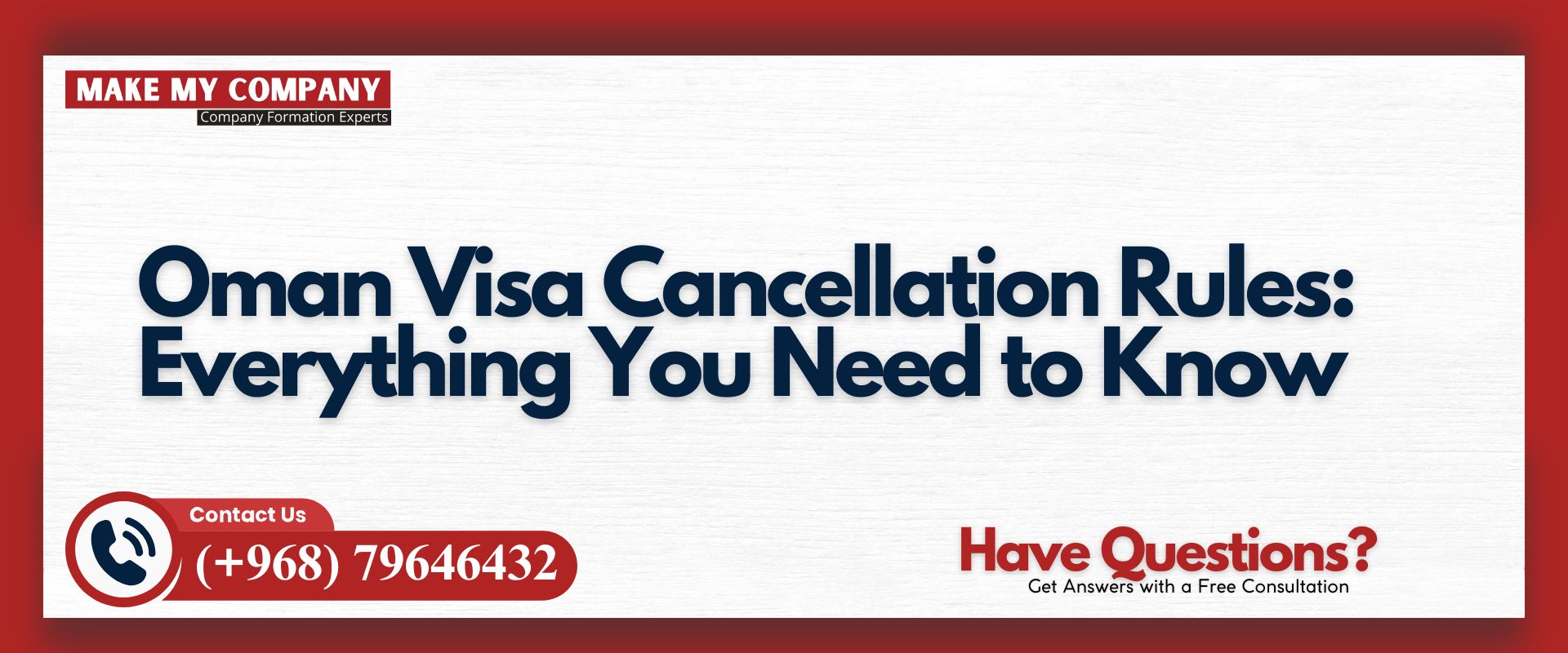As a business owner looking to register a company in Oman, understanding the taxation system is crucial for ensuring compliance and making informed financial decisions. This article provides a comprehensive overview of Oman’s taxation system, covering fundamental aspects that every business owner should know.
Introduction to Oman’s Taxation System
Oman follows a territorial taxation system, meaning taxes are imposed on income generated within the country’s borders. The Income Tax Law governs the tax regulations in Oman, Royal Decree 28/2009, and the Tax Executive Regulations, Royal Decree 29/2009.
Corporate Income Tax
In Oman, corporate income tax is levied on the profits earned by companies operating there. The current corporate income tax rate is 15%. It’s important to note that specific industries, such as oil and gas, may have different tax rates and regulations.
Value Added Tax (VAT)
Oman implemented a Value Added Tax (VAT) system starting from 1st April 2021. The standard VAT rate is 5%, with some goods and services subject to zero-rated or exempt categories. As a registered business, you must charge VAT on eligible goods and services, maintain proper records, and file regular VAT returns.
Withholding Tax
Withholding tax is applicable in Oman on certain types of payments made to non-residents, including dividends, interest, royalties, and services. The withholding tax rates vary depending on the nature of the payment and the provisions of tax treaties, if applicable. Ensuring compliance with withholding tax obligations is essential when dealing with non-resident individuals or entities.
Personal Income Tax
At present, Oman does not impose personal income tax on individuals. However, it’s worth noting that this may change as Oman continues to review its tax policies to diversify revenue sources.
Double Taxation Agreements
Oman has entered into double taxation agreements (DTAs) with several countries to prevent the same income from being taxed twice. These agreements provide relief by allowing for reduced or exempted tax rates on specific types of income. It is advisable to consult with tax professionals to understand the implications of DTAs for your business.
Tax Incentives and Exemptions
Oman offers various tax incentives and exemptions to promote investment and economic growth. These incentives may include reduced tax rates, tax holidays, and exemptions for specific industries or regions. The eligibility criteria and benefits vary, so it is essential to research and consult with authorities or experts to take advantage of these opportunities.
Transfer Pricing
Transfer pricing refers to the pricing of goods, services, and intellectual property transferred between related entities within a multinational group. Oman has specific transfer pricing regulations in line with the Organisation for Economic Co-operation and Development (OECD) guidelines. Businesses operating in Oman should ensure compliance with these regulations to avoid transfer pricing disputes.
Compliance and Reporting
As a registered company in Oman, you must maintain proper accounting records, prepare financial statements, and file annual tax returns within the specified deadlines. Non-compliance or late filing may result in penalties and fines. Engaging qualified accountants or tax professionals to assist with compliance and reporting requirements is crucial.
Conclusion
Understanding Oman’s taxation system is essential for any business owner planning to register a company there. By familiarizing yourself with corporate income tax, VAT, withholding tax, and other relevant aspects, you can ensure compliance, make informed financial decisions, and optimize your tax position. Stay updated with any changes in tax regulations and seek professional advice to navigate the complexities of Oman’s tax landscape successfully.
Remember, while this article provides valuable information, it’s advisable to consult with tax professionals or relevant authorities for specific advice tailored to your business’s circumstances. With a solid understanding of Oman’s taxation system, you can confidently embark on your company registration journey with Quickbiz in Oman.
FAQs – Oman’s Taxation System: What to Know for Company Registration
What is the corporate income tax rate in Oman?
The corporate income tax rate in Oman is currently 15%. This rate applies to the profits earned by companies operating within the country. However, it’s important to note that specific industries, such as oil and gas, may have different tax rates and regulations.
When did Oman implement the Value Added Tax (VAT) system?
Oman implemented the Value Added Tax (VAT) system on 1st April 2021. This new taxation system requires registered businesses to charge VAT on eligible goods and services provided to customers. The standard VAT rate in Oman is 5%. However, certain goods and services may fall under zero-rated or exempt categories, attracting no or reduced VAT rates.
Are there any exemptions or reduced tax rates for specific industries or regions?
Yes, Oman offers tax incentives and exemptions to promote investment and economic growth. These incentives may include reduced tax rates, tax holidays, and exemptions for specific industries or regions. The eligibility criteria and benefits vary depending on the nature of the business and its alignment with Oman’s economic development goals. Researching and consulting with relevant authorities or tax professionals is advisable to determine if your business qualifies for any specific tax incentives.
Does Oman impose personal income tax on individuals?
Currently, Oman does not impose personal income tax on individuals. This means Oman nationals are not subject to income tax on their earnings. However, it’s worth noting that tax policies can change over time, and it is advisable to stay updated with any potential updates or reforms to the tax system.
What is withholding tax, and when is it applicable in Oman?
Withholding tax is a mechanism countries use to collect taxes from non-residents on certain types of payments. In Oman, withholding tax applies to non-residents’ specific payments, including dividends, interest, royalties, and services. The withholding tax rates vary depending on the nature of the payment and the provisions of tax treaties, if applicable. Businesses must understand and comply with withholding tax obligations when dealing with non-resident individuals or entities to avoid potential penalties or disputes.
How can businesses benefit from double taxation agreements (DTAs) in Oman?
Oman has entered into double taxation agreements (DTAs) with several countries to prevent the same income from being taxed twice. These agreements provide relief to businesses by allowing for reduced or exempted tax rates on specific types of income. By leveraging the provisions of DTAs, businesses can optimize their tax position and avoid the negative impact of double taxation. It is advisable to consult with tax professionals or relevant authorities to understand the implications of DTAs for your specific business and its international transactions.
What are the compliance and reporting requirements for registered companies in Oman?
As a registered company in Oman, you must maintain proper accounting records, prepare financial statements, and file annual tax returns within the specified deadlines. Compliance with these requirements is crucial to avoid penalties, fines, or legal consequences. It is recommended to engage qualified accountants or tax professionals who can assist in ensuring compliance and proper reporting of financial information. Staying up-to-date with changes in tax regulations and seeking professional advice can help navigate the complexities of Oman’s tax landscape successfully.
What is transfer pricing, and how does it affect businesses operating in Oman?
Transfer pricing refers to the pricing of goods, services, and intellectual property transferred between related entities within a multinational group. Oman has specific transfer pricing regulations in line with the Organisation for Economic Co-operation and Development (OECD) guidelines. These regulations ensure that transactions between related parties are conducted at arm’s length, meaning the prices are set as if the entities were unrelated. Businesses operating in Oman should ensure compliance with these transfer pricing regulations to avoid transfer pricing disputes and ensure fair and transparent pricing between related entities.
Where can businesses seek professional advice and guidance regarding Oman’s taxation system?
Understanding and navigating Oman’s taxation system can be complex. To ensure accurate and up-to-date information, it is advisable to seek professional advice and guidance. Qualified tax professionals, accounting firms, and legal advisors with expertise in Oman’s tax laws can provide valuable insights tailored to your business needs. Additionally, relevant government authorities, such as the tax authority or the Ministry of Finance, may offer resources and support to help businesses understand and comply with the taxation system.









